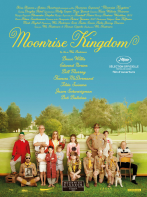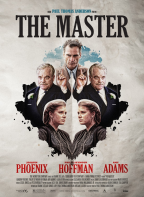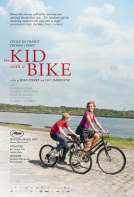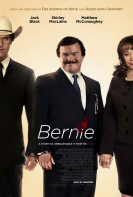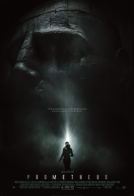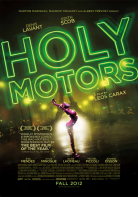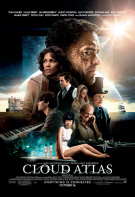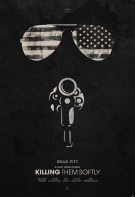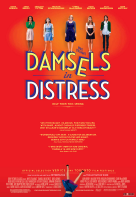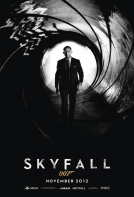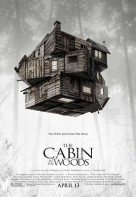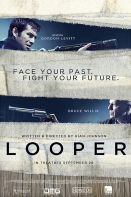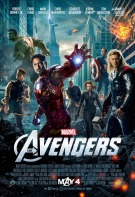Print Edition: January 16, 2013
It can be everything to know where someone’s coming from, so of course The Master offers no help at all. Freddie Quell (Joaquim Phoenix) and Lancaster Dodd (Philip Seymour Hoffman) and Peggy Dodd (Amy Adams) arrive interrupted in Paul Thomas Anderson’s latest, and aside from an early high-velocity reverie—dresses, drinks, demolition—The Master loses sensation, senses, a numbing that leads to following (where double meaning/vision abounds). While The Master “fits” as a too-lengthy explanation of masculinity or a slow post-war period picture of aimlessness, it might be best traced as a companion to something like The Last Temptation of Christ: childish devilry on one side, human on the other, belief and torture somewhere in between. – M.S.
The kid runs away, toward, crashes into, returns to beginnings – as The Kid with a Bike begins, the Dardennes focus in on abandoned Cyril, and apply an ethic of care. The symbolic colors and simple structure make the likening to a tale or seeing license in place of the Dardennes’ usual stronger commitment to realism—dialogue that half-reveals at best and slow progression—an easy label, but The Kid With a Bike isn’t on either side. This is poetry through prose, a heart-quickened extension travelling down wrong turns that takes place in the near-empty, darkened streets of Liège. And then Beethoven sounds, Cécile De France holds on (“but not so tight”) and an ending doesn’t arrive, nor is it “happy” – it is simply rewritten. – M.S.
Jack Black’s impressive (and considering it’s Jack Black, impressively subtle) performance as Bernie Tiede, a real-life mortician and beloved community icon in the small East Texas town of Carthage, is some of the best acting of his career. Director Richard Linklater (Dazed and Confused, A Scanner Darkly) turns a true-life tale of transgression, forgiveness and romantic encounters with elderly women into a black, southern gothic comedy. It’s carefully-handled and exhibits surprising depth and generic range, moving between courtrooms, autopsies and elaborate small-town musicals with ease. Propelled by a sincerely-delivered gospel music soundtrack and interviews with real residents of Carthage who knew the embattled mortician, Bernie is a moving rumination on the strange story of God, the devil and Bernie Tiede. – N.U.
The insane two halves of Prometheus: the slow speechless draw of dumb horror (already abandoned, they see something new and . . . reach out towards it, mouths agape) and the quick digital spectacle of wonder at recorded phantoms, visible dreams, and the height of human(?) engineering: an android that can perfectly mimic a film character (Michael Fassbender). And arching over the entire beautiful, ridiculous enterprise is Prometheus as litmus test for belief, a type anyway, discarding timelines and history (they’re there, but it’s fruitless to follow) – there may be a sequel, but taken on its own, Prometheus’ silence in response to “why” and “they must know” both allows for its genre roots to show and mimics its own structure – the momentary thrill of not knowing. – M.S.
The beauty of the Act—sevenfold or one, self-referential or entirely self-contained— becomes the question of the act – how to go on, how to know when the camera’s turned on, when acting is off – becomes the chameleon Beauty of Holy Motors, Leos Carax’s first film in far too long. Does Denis Lavant’s performance(s) exist digitally, virtually, in the mind, on film, through surveillance, as a part of “real life,” and is this a guide through a series of memories of scenes never shot or a resurrection of what has already been – “who were we when we were who we were” sings an actor, and she stands where something real happened, is happening, and Carax can’t, won’t stop the growing momentum until it breaks down – and for a while, it looks totally living. – M.S.
Making a movie about Abraham Lincoln is a daunting task, even for Steven Spielberg. For a man whose fame and pop culture status have been relegated to caricature, making Lincoln into a believable person is incredibly difficult. Thankfully, Lincoln forgoes the Gettysburg Address, the sweeping speeches and the hard-knock log-carrying childhood of its titular character and focuses in on the months surrounding the passage of the 13th amendment. It depicts a messy congressional process fraught with dubious backroom dealings and a long-winded storyteller of a president. No groundbreaking cinema, but everyone, actors, writer, director, composer, cinematographer, doing everything at full-strength, turning what could have been an emptily sweeping epic into an intimate, nuts and bolts political drama. – N.U.
Cloud Atlas is a rare gem, a movie that both offers a massive, tantalizing panorama, and refuses to subsequently narrow its scope into a single, grungy microcosm. While viewers may be put off by the plot’s eccentricity, the pervasive post-apocalyptic pidgin dialect, or the indulgently grandiose didacticism, Cloud Atlas is a movie with a profound and exciting vision. At 172 minutes, this film is a significant commitment, but its attempt to weave six interlocking stories into one cohesive whole demands evaluation. Are we, as individuals, as closely connected as Cloud Atlas suggests? Can one small artistic work one day inspire a future revolution? In the tapestry of story that is Cloud Atlas, anything is possible. – P.E.
Society is rotten all the way through, from the top to the bottom, says the idea behind Killing Them Softly, Andrew Dominik’s adaptation of George V. Higgins 1974 novel Cogan’s Trade. The backdrop of this unsentimental crime drama is a post-Katrina New Orleans during the lead up to the 2008 Presidential election and features sound bites from both President Barack Obama and George W. Bush concerning America’s crumbling economy. Like Dominik’s 2007 tour de force The Assassination of Jesse James, the main characters in Killing Them Softly are all brutal and sly criminals, hit by hard financial times. The subject matter and the honest way in which the movie portrays it make the movie somewhat taxing at times to sit through, however I think those willing to consider the necessity of telling the story of Killing Them Softly will find it both enthralling and thought-provoking. – T.U.
Against intellectualism, the shame of not knowing, playboy or operator types, and toward a campus life of the constant presentation of a will to help, good sense and scent, and the drug of dancing, so go the declarations of idea leader Violet (Greta Gerwig) . The “campus” qualifier is only because that’s where Damsels in Distress happens to be set: Whit Stillman’s first film in a decade would, must exist for the length of a degree “only numerically.” If the jokes are a bit broader than Metropolitan or Barcelona, Gerwig and Adam Brody still nail Stillman’s style of inflection, pauses, and looks, which reveal more with each watch: “there’s enough material here for a lifetime of social work.” – M.S.
A movie about competitive college a cappella groups written by 30 Rock and New Girl writer Kay Cannon starring the scene-stealing Rebel Wilson – where have you been all my life? It’s too easy to hear the summary and complete a Liz Lemon eye roll without first understanding why this movie is worth being played on loop. Rebel Wilson plays Fat Amy, a scene-stealer the likes of Melissa McCarthy in Bridesmaids, producer Elizabeth Banks and Christopher Guest alum John Michael Higgins provide the greatest college a cappella commentary one could dream up, and Cannon’s perfect mix of intelligent humour and body fluid jokes provide just the right amount of memorable quotes to put this movie on the college movie canon. – A.V.
Sam Mendes’ addition to the Bond movie franchise may not have wowed everyone, but being my first Bond experience (I’ll let the gasps subside), I thought it was excellent. Certain scenes of Skyfall will forever be ingrained in my memory: Bond fighting amidst the billboard lights in an all-glass Shanghai skyscraper, jumping on the back of a torn apart train car before smoothly adjusting his shirt cuffs, Dame Judi Dench stealing the spotlight as Bond-lady M, and the hair-raising opening credits care of Golden Globe winner Adele. Any movie that immediately forces me to go back and watch the preceding films is worth my time. – A.V.
A horror movie about horror movies, voyeurism, and storytelling itself, The Cabin in the Woods is more than meets the eye. Better experienced without too many details disclosed, yet perhaps even more rewarding after multiple viewings, this movie has fuelled endless conversations about its structure, meanings, and plentiful generic references and callbacks. Created by geek idol Joss Whedon and Cloverfield director and Buffy writing room alum Drew Goddard, it manages to work as both a frightening horror story, self-aware genre comedy, and commentary on the art of storytelling. It’s one of the smartest and rewarding genre films of the year. – N.U.
Looper, Rian Johnson’s unique sci-fi vision of the future, isn’t full of neon lights, space travel, underground societies or skyscrapers that reach incredible heights; this future is actually very much like our present, but much more dank and dark. And there’s time travel. While the film is filled with bouts of action and mysterious elements, those elements aren’t front and centre, as the film’s strength comes from its slow boil, with the second act challenging the audience to think about why we want to protagonist to achieve their goals. – T.U.
Built upon the groundwork of two Iron Man films, Thor, Captain America and The Incredible Hulk, The Avengers takes some of Marvel’s biggest heroes and assembles them via a simple alien invasion, which helps install the idea of all of these characters working together in a believable fashion. Writer and director Joss Whedon has created a film that is an extension of these individual films without rehashing what the audience has already seen. In fact, considering what Whedon had to work with, it’s a miracle this movie comes together so well. The Avengers is well-polished like the other Marvel films, but it is also heartfelt, witty, exciting and grapples with the meaning of heroism. – T.U.
Wes Anderson’s most recent film is the work of someone keenly aware of his strengths as a filmmaker. Ever since the admittedly fun, but distracting excesses of The Life Aquatic and its reactionary, minimal follow-up The Darjeeling Limited, Anderson has been embracing his meticulously detailed film-making process to craft little worlds, familiar but otherworldly, all their own. In Moonrise Kingdom, this world is an island somewhere in New England. Moonrise Kingdom is a fairy tale about two young runaways and misfits who fumble their way through pre-adolescent romance and responsibility, cutting a path through a wilderness that poses not necessarily more, but different dangers than those of their day-to-day lives. Their escape transgresses the order of parental authority, siblings, scout troops, the island’s single police officer: the demonstrably broken, adult world. Yet in their escape, these kids consistently strive to recreate the very adult world they struggle against. Captured within the movie’s elaborate artifice is a glimpse of this delicate, inter-generational cycle. – N.U.
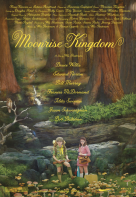 “You don’t know what you’re talking about.” The miscommunicated communicated, love explained through images, the past as treasured, exact, but not the place Suzy (Kara Hayward) and Sam (Jared Gilman) are writing to. This isn’t the most-anything of Wes Anderson’s films, but a further refinement, growth, where the question of if any of his characters will grow up, and then if they’ll just end up like the adults (absent from, exasperated with life) is intervened, irrupted by a series of awakenings that do not merely recall Anderson’s range but requite the intimate, finite feeling that rushes through the montages, tracking shots, and time, slowed to a moment, timed to light in silent, grand nature, here in Moonrise Kingdom. – M.S.
“You don’t know what you’re talking about.” The miscommunicated communicated, love explained through images, the past as treasured, exact, but not the place Suzy (Kara Hayward) and Sam (Jared Gilman) are writing to. This isn’t the most-anything of Wes Anderson’s films, but a further refinement, growth, where the question of if any of his characters will grow up, and then if they’ll just end up like the adults (absent from, exasperated with life) is intervened, irrupted by a series of awakenings that do not merely recall Anderson’s range but requite the intimate, finite feeling that rushes through the montages, tracking shots, and time, slowed to a moment, timed to light in silent, grand nature, here in Moonrise Kingdom. – M.S.

